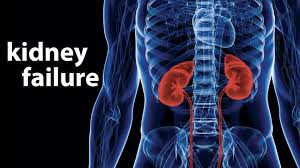- Home
- Editorial
- News
- Practice Guidelines
- Anesthesiology Guidelines
- Cancer Guidelines
- Cardiac Sciences Guidelines
- Critical Care Guidelines
- Dentistry Guidelines
- Dermatology Guidelines
- Diabetes and Endo Guidelines
- Diagnostics Guidelines
- ENT Guidelines
- Featured Practice Guidelines
- Gastroenterology Guidelines
- Geriatrics Guidelines
- Medicine Guidelines
- Nephrology Guidelines
- Neurosciences Guidelines
- Obs and Gynae Guidelines
- Ophthalmology Guidelines
- Orthopaedics Guidelines
- Paediatrics Guidelines
- Psychiatry Guidelines
- Pulmonology Guidelines
- Radiology Guidelines
- Surgery Guidelines
- Urology Guidelines
Potential new treatment for kidney failure in cancer patients

Kidney dysfunction is a frequent complication affecting more than 50 percent of all cancer patients, and is directly linked to poor survival. Despite the high occurrence, it is still not clear how presence of a tumour contributes to kidney dysfunction and how this can be prevented. A new study from researchers at Uppsala University shows that kidney dysfunction can be caused by the patient's own immune system, 'tricked' by the tumour to become activated.
The study is published in the scientific journal Oncoimmunology and describes how a cell type in the blood, the neutrophil, causes kidney dysfunction in mice with cancer. The data suggests that these neutrophils are promising targets for future therapies to treat kidney injury in cancer patients.
Neutrophils play an important role in our immune system to protect us against infections. However, a tumour can trick neutrophils to become activated even in the absence of an infection, and as a consequence they contribute to disease progression and tissue damage.
"We have previously demonstrated that neutrophils form so called neutrophil extracellular traps, NETs, in the vasculature of mice with cancer, which cause impaired blood flow and inflammation in organs such as kidneys. Our new findings show that this leads to decreased kidney function in mice with cancer," says Anna-Karin Olsson, researcher at the Department of Medical Biochemistry and Microbiology at Uppsala University, who led the study.
The signs of kidney damage in mice resemble those observed in cancer patients, suggesting that NETs could be a cause of kidney dysfunction also in humans.
The study also shows that kidney function can be restored in mice with cancer through treatment, using an inhibitor to target the enzyme peptidyl arginine deiminase 4 (PAD4) - an enzyme required for neutrophils to form NETs. This is promising since it shows that kidney function can be restored if NETs are removed. The inhibitor (GSK484) has previously proven to be effective in preventing formation of NETs both in mouse and human neutrophils in test tubes. This study is the first to demonstrate the potential of the inhibitor GSK484 to prevent kidney damage in mice with cancer.
"We believe that these findings can lead to novel treatment options to prevent kidney damage and improve survival rates in cancer patients," says Jessica Cedervall, researcher at the Department of Medical Biochemistry and Microbiology at Uppsala University.

Disclaimer: This site is primarily intended for healthcare professionals. Any content/information on this website does not replace the advice of medical and/or health professionals and should not be construed as medical/diagnostic advice/endorsement or prescription. Use of this site is subject to our terms of use, privacy policy, advertisement policy. © 2020 Minerva Medical Treatment Pvt Ltd